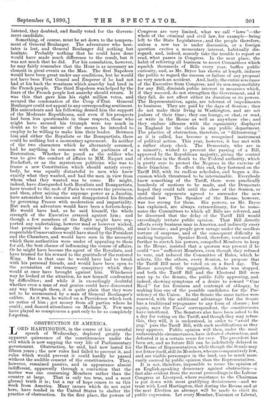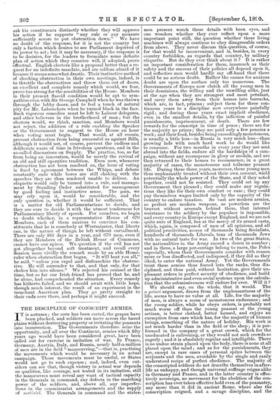OBSTRUCTION IN AMERICA. Congress are very limited, what we call
" laws "—the whole of the criminal and civil law, for example—being left to the State Legislatures ; and the people therefore,. unless a new tax is under discussion, or a foreign question excites a momentary interest, habitually dis- regard, and, indeed, scarcely take the trouble to report or read, what passes in Congress. In the next place, the habit of referring all business to secret Committees which squelch thousands of Bills every year, baffles public curiosity, and, as Mr. Bryce has shown at length, induces the public to regard the success or failure of any proposal as very much an accident. And, lastly, the entire severance of the Executive from Congress, and its non-responsibility for any Bill, diminish public interest in measures which,. if they succeed, do not strengthen the Government, and if they fail, do not affect either its duration or its powers. The Representatives, again, are tolerant of impediments to business. They are paid by the days of Session ; they do not make their living in Washington, and are not- jealous of their time ; they can lounge, or chat, or read, or write in the House as well as anywhere else ; and they endure idleness with the equanimity displayed in England by the clerks in any public department. The practice of obstruction, therefore, or " filibustering " as it is called, has become a recognised instrument of political action. This year, however, it has met with a rather sharp check. The Democrats, who are in a minority, wished to prevent the passing of a Bill, approved by the Republican majority, giving the control of elections in the South to the Federal authority, which is pretty sure to protect the Negroes in the exercise of their franchise. To effect this end, they fastened on the Tariff Bill, with its endless schedules, and began a dis- cussion which threatened to be interminable. Everybody knew something of the Tariff, there were practically hundreds of motions to be made, and the Democrats hoped they could talk until the close of the Session, or until their opponents agreed to surrender the new electoral law. The Speaker of the House, however,. was too strong for them. His powers, as Mr. Bryce has explained, are always extraordinary, for he nomi- nates the Committees to which all Bills are referred, and he discerned that the delay of the Tariff Bill would exceedingly irritate public opinion. That Bill directly affects every business man in America, and indirectly every man's income ; and people grew savage under the needless torture of suspense, and of the consequent difficulty in making bargains. Speaker Reed, therefore, ventured still further to stretch his powers, compelled Members to keep in the House, insisted that a quorum was present if he could " see" sufficient Members, even though they refused- to vote, and induced the Committee of Rules, which he selects, like the others, every Session, to propose that the Tariff Bill must be voted on on a fixed day. The House accepted this suggestion, debate was stopped, and both the Tariff Bill and the Electoral Bill were sent up to the Senate, the public fully approving, and, indeed, showing symptoms of a desire to reward " Czar Reed" for his firmness and contempt of obloquy, by making him one of the possible candidates for the Pre- sidency of the Union. In the Senate the same tactics were renewed, with the additional advantage that the Senate has a traditional repugnance to any form of closure ; but again, says the Times' correspondent, the constituencies have interfered. The Senators also have been asked to fix a day for voting on the Tariff, and though they may refuse this, they will, it is understood, in order to " avoid the gag," pass the Tariff Bill, with such modifications as they may approve. Public opinion will then, under the most unfavourable circumstances, have defeated obstruction, and defeated it in a certain sense for ever. The precedent has been set, and no future Bill can be indefinitely delayed in the House of Representatives, while though the Senate may not fetter itself, still its Members, who are comparatively few, and are visible personages in the land, can be much more easily coerced by public opinion than the Representatives. It is not, therefore, impossible to rouse the opinion of an English-speaking democracy against obstruction—a fact also evident from the recent proceedings in the Labour Congress at Liverpool, where resistance to the Chairman is put down with most gratifying decisiveness—and we trust with Lord Hartington, that during the Recess and at the next Election an attempt will be made to elicit its public expression. Let every Member, Unionist or Liberal, ask his constituents distinctly whether they will approve his action if he supports " any rule or any measure sufficiently severe to put obstruction down." We have no doubt of the response, for it is not the country but only a faction which desires to see Parliament deprived of its power to act ; but it may be necessary, if the response is to be decisive, for the leaders to formulate some definite plan of action which they conceive will, if adopted, prove effectual. English electors like a proposal better than a re- quest for an indefinite mandate, and are seldom afraid of it because it seems somewhat drastic. Their instinctive method of checking obstruction in their own meetings, indeed, is to throttle the obstructives and throw them out of doors, an excellent and complete remedy which would, we fear, prove too strong for the sensibilities of the House. Members in their present flaccid condition would be apt to sym- pathise even with Sir George Campbell when he was thrown through the lobby doors, and to feel a touch of natural pity for Mr. Labouchere when he turned black in the face. Such vigorous remedies must be left to Labour delegates, and other believers in the brotherhood of man ; but the electors would, we think, sanction, and Members would not reject, the addition of a rule enabling the Speaker or the Government to suggest to the House an hour when voting must begin. That would, at all events, prevent obstruction from being successful as against Bills, although it would not, of course, prevent the endless and deliberate waste of time in frivolous questions, and in the so-called discussions on Supply. The practice, too, so far from being an innovation, would be merely the revival of an old and still operative tradition. Even now, whenever obstruction has not been resolved on, the hour of voting is fixed by agreement between the Whips, and debate constantly ends while bores are still choking with the speeches they are thus rendered unable to deliver. An etiquette would only be turned into a rule, and manage- ment by Standing Order substituted for management by good feeling and instinctive sense. The gain, we may rely upon it, would be considerable, and the only question is, whether it would be sufficient. That is a matter for old Parliamentarians to decide, and they are sure to decide it with the utmost tenderness for Parliamentary liberty of speech. For ourselves, we begin to doubt whether, in a representative House of 670 Members, each of them anxious to convince his con- stituents that he is somebody at Westminster, that liberty can, in the nature of things, be left without curtailment. There are only 365 days in a year, and 670 men, even if they are Members of the British House of Commons, cannot have one apiece. We question if the evil has not got altogether beyond soft treatment, and recall every Session more vividly the remark made by an able Home- ruler when obstruction first began. " It will beat you all," he said, " unless you expel and disfranchise the obstruc- tive. He will surrender to that, and that only, for that chokes him into silence." We rejected his counsel at the time, but so far our Irish friend has proved that he, and he alone, had comprehended the situation. Every remedy has hitherto failed, and we should await with little hope, though much interest, the result of an experiment in the trenchant American plan. They go pretty straight to their ends over there, and perhaps it might succeed.



































 Previous page
Previous page